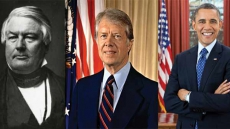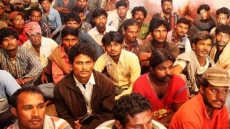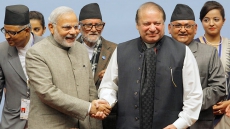WASHINGTON — Donald Trump had a contentious first week for a presumptive presidential nominee.
His party's former presidents and last nominee wouldn't endorse him. The top Republican lawmaker said he'd consider it — but Trump essentially told him to get lost. This isn't just a personality tiff.
Sincere policy differences exist between Trump and conservatives like that top lawmaker, House Speaker Paul Ryan. The nominee is a populist with views that waver from left to right. Some say he'll transform the party.
"I don't tack right or left," Trump said this week of his political philosophy.
"I tack to what's right."
Here are ways the Republican standard-bearer disagrees with Republican standards:


—Taxes: He once proposed the biggest tax increase in U.S. history. When pondering a presidential run in 2000, he suggested a one-time tax hit on millionaires to pay off the national debt. He's reversed course. He now proposes tax cuts that would disproportionately benefit the wealthy. But he's changed his tune again.
After locking up the nomination this week, he told a TV interviewer he's "not a big fan" of helping the rich, said his priority was the middle class and described his tax plan as negotiable. He's also moved to the left on the minimum wage — he opposed an increase during the primaries and now says he's open to it.

—Social issues: For a prominent Republican, he can be pretty liberal. He's criticized North Carolina for its bathroom law targeting transgender people. However, he's in lockstep with the party orthodoxy against same-sex marriage. On abortion, he's been all over the map. Long pro-choice, he said during the primaries that his opinion had switched — he even suggested recently that women should be punished for having an abortion. He quickly took that back.

—Trade deals: The Republican party has historically supported trade deals — three-quarters of its lawmakers voted for NAFTA in 1993. Trump apparently hates every current trade pact. He calls them bad deals, signed by weak politicians. He blames them for killing blue-collar jobs and hammers that message in key states like Ohio, Michigan and Pennsylvania.
Trump opposes the new Trans-Pacific Partnership. He's proposed ripping up NAFTA. He was less explicit in a major speech recently, but said of NAFTA: "Never again." Public opinion seems split: Respondents tell pollsters they support more trade in theory — but also tell pollsters they oppose existing deals and want to limit imports. Trump happens to share that double-sided position: that trade could be good, but the deals aren't and there are too many imports.

—Foreign policy: This one's tricky. Republicans have varying views on foreign affairs. But Trump is deeply at odds with the last Republican president, George W. Bush. Trump has no patience for talk about spreading democracy. He essentially blames current Mideast chaos on the president who tried nation-building in Iraq and Afghanistan: "With the dangerous idea that we could make Western democracies out of countries that had no experience or interest in becoming a Western democracy, we tore up what institutions they had and then were surprised at what we unleashed. Civil war, religious fanaticism, thousands of American lives, and many trillions of dollars, were lost as a result."
Trump promises a strong military and speaks belligerently sometimes. Yet he favours withdrawing from foreign bases, or cutting costs abroad. Polls say the U.S. public generally agrees that spreading democracy is a low priority.

—Law and order: A rare issue where he might be more conservative than party elites. Trump proudly calls himself tough-on-crime — an out-of-fashion label. He favours strict sentences. In the most incarcerated country on Earth, justice reform is all the rage. It's happening nationally, in multiple states, and both parties are involved.
Reforms are underway at the state and national level — with both parties participating. He's also swimming against the current on drug laws. He favoured drug legalization a quarter-century ago; now some states are legalizing marijuana and he's gone the other way. Now he opposes it — but says the choice should belong to individual states.






